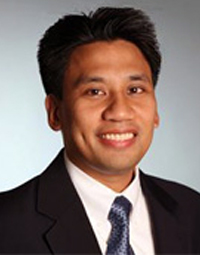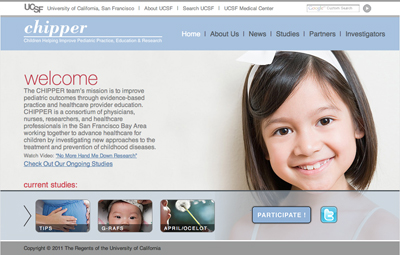New Pediatric Website Streamlines Access to Clinical Trials
Children are prescribed medication at nearly half of medical visits, but about 30 percent of those drugs have only been studied and approved for use in adults.

Michael Cabana, MD, MPH
This situation is due to a lack of clinical trials devoted to learning more about the best ways to treat kids, who cannot be treated simply as miniature adults.
To help disseminate information about pediatric clinical trials, the UCSF Division of General Pediatrics has launched a new website called CHIPPER – Children Helping Pediatric Practice, Education & Research – that offers a clearinghouse for streamlined access to the latest news and information on UCSF’s general pediatric clinical trials.
“I don’t think most parents realize that many of the medicines we prescribe for kids are based on studies of adults,” said Michael Cabana, MD, MPH, chief of the UCSF Division of General Pediatrics. “It is hand-me-down research.”
Cabana was one of four researchers who conducted a 2006 study published in Clinical Pediatrics that examined the Food and Drug Administration (FDA) labeling status of pediatric medications. Assessing the pediatric labeling status of medications listed in the Harriet Lane Handbook – the go-to manual for pediatric health care providers – the investigators found that out of 441 meds listed in the handbook, almost 1 out of 3 is prescribed off-label, meaning it has not been studied and approved by the FDA for use in children.
“People assume when a medication is listed in the handbook there are studies behind it,” said Cabana. “But that’s not the case and it’s not as simple as just halving the dose from adults to kids.”
Website Offers One-Stop Resource for Pediatric Clinical Trials
Clinical trials are limited in the pediatric population for several reasons. Children have less chronic conditions than adults. The market for pediatric medications is smaller, however, the costs in running clinical trials are still substantial. As a result, the cost-benefit of conducting extensive trials is much less favorable for pediatric conditions. In addition, pediatric clinical trials require special expertise and facilities, few medical centers specialize in conducting pediatric trials, and parents may not be aware of trials or may be reluctant to have their children participate.

The UCSF Benioff Children’s Hospital’s Division of General Pediatrics has developed a large collection of pediatric clinical trials. These general pediatric clinical trials are focused on health issues seen in the community rather that the hospital. UCSF investigators are examining key areas such as how to improve breastfeeding, childhood nutrition, fitness in school kids, as well as how to prevent asthma flare-ups or how to best treat infant colic symptoms.
All of these trials are listed on the new website, which acts as a one-stop shop for inquisitive Bay Area parents and primary care physicians searching for information about emerging outpatient treatments for children. “We have a growing number of investigators in general pediatrics focused on common conditions in the community,” said Cabana. “When you conduct a study that might show how to even marginally improve a pediatric condition, and if that condition is common in everyday practice, it can affect a lot of kids directly and have a big public health effect.”
Recruiting a diverse sample from the community is essential to the UCSF’s mission to expand these clinical trials and have a bigger impact on improving treatments. Unlike doing a study in a small homogenous community, San Francisco’s diverse population has the potential to represent more of backgrounds, cultures and countries that make up the general population of the United States.
“We have a big responsibility here to reach out so we’re not getting the same patients from the same neighborhoods with the same backgrounds, because it will only help those patients,” said Cabana. “We need better information on how to treat kids to make sure we have the most accurate dosing and most accurate formulation for what’s most effective for the health of all children.”